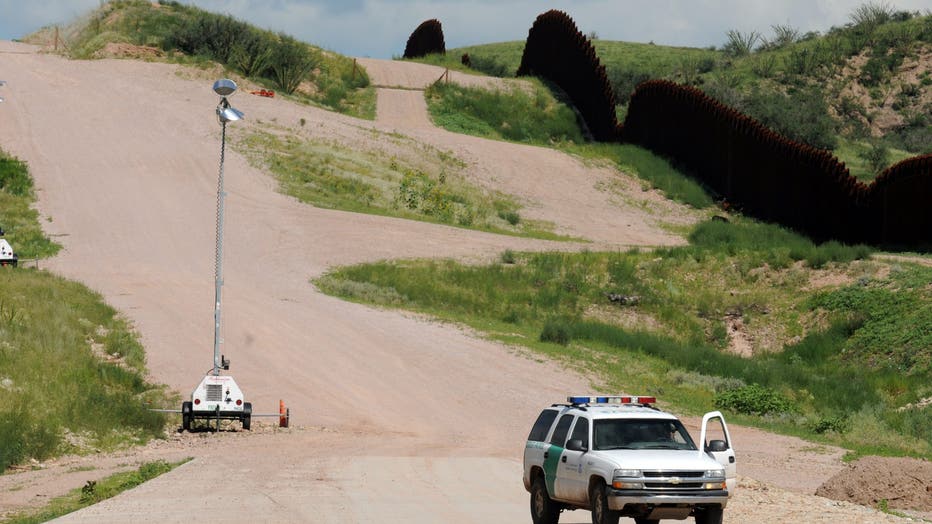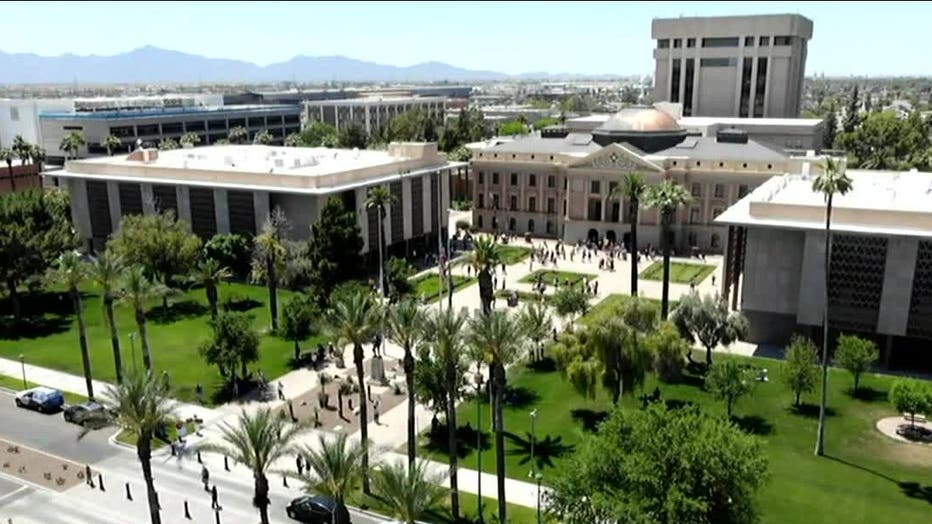Proposition 314: What you should know about Arizona's Secure the Border Act
PHOENIX - Come November, Arizona voters will get to decide on a ballot initiative that deals with immigration.
The measure, if approved by voters, will create a number of crimes that target unauthorized border crossings by people who are not U.S. citizens or nationals, as well as the sale of fentanyl.
Here's what to know about Proposition 314.
What is Proposition 314?
Proposition 314 is a law proposal that was referred to the ballot by state lawmakers. The measure was referred to the ballot by the Arizona State Legislature in May 2024, and cleared for the ballot by the state Supreme Court in August, after the measure became the topic of a legal challenge.
Per an analysis by the Legislative Council, the ballot measure aims to make changes to the Arizona Revised Statutes by:
- Creating a new a class 6 felony law that bans a natural person who is not in the country legally from "knowingly submitting false documentation when applying for a federal, state or local public benefit." According to the Cornell Law School's Legal Information Institute (LII), "natural person" is a legal term for a living human being.
- Creating a new crime that bans a natural person who is not in the country legally from "knowingly submitting false information or documents to an employer to evade detection for employment eligibility under the E-Verify program."
- Creating a new crime that bans a person who is at least 18 years old from "knowingly selling fentanyl in violation of the current drug laws if the person knows the drug sold contains fentanyl and the fentanyl causes the death of another person."
- Creating a new crime that bans a person who is an alien from "entering or attempting to enter this state directly from a foreign nation at any location that is not a lawful port of entry." Alien is defined by the LII as a legal term that refers to anyone who is not a U.S. citizen or a U.S. national.
- Creating a new crime that bans a person who is an alien from "[entering] this state at a location other than a lawful port of entry and refuses to comply with an order to return to a foreign nation or the alien's nation of origin."
The measure, per its analysis, also states that "a state or local government entity, official, employee or contractor has civil immunity" for actions taken to enforce laws that ban an alien from entering Arizona via a place that is not a lawful port of entry.
What are the consequences of violating Proposition 314?

(File Photo)
The proposition lists some of the legal consequences for violating the new crimes proposed in the measure.
For the crime of "knowingly submitting false information or documents to an employer to evade detection for employment eligibility under the E-Verify program," the measure would classify it as a class 1 misdemeanor for those who have never been convicted of such a crime before. For subsequent convictions, it's deemed a class 6 felony.
"A person convicted of this crime would be required to be incarcerated for a period of time as determined by the court before the person could be released on probation or any other type of release," read a portion of the analysis for the ballot measure.
For the crime of "knowingly selling fentanyl in violation of the current drug laws if the person knows the drug sold contains fentanyl and the fentanyl causes the death of another person," the measure analysis states that it will be a class 2 felony, and will "require that any prison sentence imposed on the person be increased by five years."
With regards to the crime of an alien "entering or attempting to enter this state directly from a foreign nation at any location that is not a lawful port of entry," the measure analysis states the crime is a class 1 misdemeanor for first offenses, and a class 6 felony for subsequent violations. A court would be allowed to dismiss the charge if the alien in question agrees to be returned to "the foreign nation from which the alien entered or attempted to enter the United States or to their nation of origin and meets other conditions."
As for the crime of "[entering] this state at a location other than a lawful port of entry and refuses to comply with an order to return to a foreign nation or the alien's nation of origin," the ballot measure analysis states the crime will be classified as a class 4 felony, but a court would be allowed to dismiss the charge if the alien in question agrees to be returned to "the foreign nation from which the alien entered or attempted to enter the United States or to their nation of origin and meets other conditions."
Aren't there similar federal laws on immigration?

A Border Patrol agent watches the U.S. border with Mexico near Nogales, Ariz. (Photo by Staff Sgt. Jim Greenhill, National Guard Bureau)
Per the LII, there is a federal law that makes it a crime for an alien to:
- Enter or attempt to enter the U.S. "at any time or place other than as designated by immigration officers."
- Elude examination or inspection by immigration officers.
- Attempt to enter or obtaining entry to the U.S. "by a willfully false or misleading representation or the willful concealment of a material fact."
According to the American Immigration Council, it is also a federal crime to enter or attempt to enter the U.S. after having been deported, ordered removed, or denied admission. They say illegal entry is a misdemeanor, while illegal reentry is a felony.
The American Immigration Council noted that in recent years, illegal entry and illegal reentry became the most prosecuted federal offenses.
"Indeed, as of December 2018, they constituted 65 percent of all criminal prosecutions in federal court. Prosecutions for entry-related offenses subsequently declined when the government began expelling migrants back into Mexico rather than prosecuting them," read a portion of the American Immigration Council's website.
Despite the presence of federal immigration laws, the Associated Press reported in April 2024 that some Republican-led states are giving broader powers to local police and impose criminal penalties for those living in the U.S. illegally, as the issue of immigration enforcement has remained a central issue during this year's elections.
What was Arizona's SB 1070 immigration law?
In their article on the death of former Arizona lawmaker Russell Pearce in 2023, the Associated Press stated that Arizona passed an immigration legislation known as SB 1070 in 2010. Pearce was the bill's lead sponsor.
SB 1070 required law enforcement officers to inquire about suspects’ immigration status if they had reason to believe they were in the U.S. illegally. Legal challenges were filed over SB 1070’s constitutionality and its compliance with civil rights law, with detractors arguing that the law encouraged the racial profiling of Latinos.
The U.S. Supreme Court upheld the provision requiring immigration status checks during law enforcement stops, but struck down three other provisions.
What are supporters saying about Proposition 314?

The Arizona State Capitol, home to the Arizona State Legislature, which referred what is now Proposition 314 to the voters.
In the pamphlet, some of the people who support the measure accuse the federal government of failing to uphold current immigration laws, and say the measure is necessary in light of that.
"How would you be affected if the government stopped enforcing property laws and just anyone could come and live in your residence with you? When you allow someone to move in with you, you vet that person. Shouldn’t our borders be the same?" John Hassett of Phoenix wrote. "Let state Law Enforcement do what the Federal Officers are being prevented from doing."
What are opponents saying about Proposition 314?
Some of the measure's opponents state, in the pamphlet, said the measure could negatively impact Arizona communities.
"This bill has the potential to lead to increased racial profiling, which can foster distrust and fear within our communities. It may deter cooperation with law enforcement among mixed-status families, making our neighborhoods less safe. Additionally, the financial and moral costs imposed on our community by this act are substantial and unjustifiable," wrote Rev. Katie Sexton of Phoenix.
What are the polls saying about Proposition 314?

Figures from a poll released on Sept. 2 by Noble Predictive Insights show that 63% of Arizona voters say they will support the measure, while 16% of those surveyed say they will not.
"The highest support for Prop 314 was among conservatives (80%), Republicans (77%) – especially Trump-first Republicans (81%) – and voters over the age of 65 (72%). Statewide support for the ballot measure is further buoyed by majority backing from traditionally liberal blocs, including college and post-graduates (58% would vote "yes"), Hispanics (56%), Democrats (52%), and 18-to-34-year-olds (52%)," officials with the polling firm wrote.
Numbers from the poll, however, also show that not all components of the ballot measure are equally popular.
"According to the poll, supporters of the measure most strongly back two of its planks: holding drug dealers responsible for the death of a person who consumes a drug containing fentanyl (77% support), and requiring employers to verify the immigration status of workers (75% support). Their feelings are more mixed (56% support) about reforms surrounding how migrants obtain public benefits," a portion of the statement reads.

